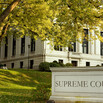Liman Center and LSO Announce Inaugural Curtis-Liman Clinical Fellow

The Arthur Liman Center for Public Interest Law and the Jerome N. Frank Legal Services Organization at Yale Law School are pleased to announce that Alex Wang has been selected to be the first Curtis-Liman Clinical Fellow. The fellowship, to begin in the fall of 2020, is designed to enable a law school graduate to do innovative work related to criminal law and immigration. The fellowship, made possible through the generosity of Alan Bersin and Lisa Foster, was recently established to honor Professor Dennis Curtis, who was a co-founder of Yale Law School’s clinical program.
Alexander Wang graduated from NYU Abu Dhabi and holds another degree from the University of Oxford. He graduated from Yale Law School in 2019, where he was part of the Worker and Immigrant Rights Advocacy Clinic and was a Coker Fellow. Wang spent a summer with the ACLU Immigrants’ Rights Project. This year, through his Heyman Fellowship, Wang is on the staff of the Subcommittee on Immigration and Citizenship at the Judiciary Committee of the U.S. House of Representatives. His work includes drafting legislation to enhance the fairness of proceedings in immigration adjudication; improving congressional oversight of immigration decisions of the executive branch, and shaping bipartisan legislation to improve the system governing agricultural labor.
As the Curtis-Liman Clinical Fellow, Wang will be under the supervision of Clinical Professor Fiona Doherty ’99 and other faculty teaching the Criminal Justice Clinic. Wang will also work with Lucas Guttentag, the Martin Flug Lecturer in Law, who has developed a research project to track all immigration policy changes adopted since January 2017. Guttentag was the founder and former director of the ACLU Immigrants’ Rights Project and served in senior positions at the Department of Homeland Security during the Obama Administration. Wang will also participate in the activities of the Liman Center, begun in 1997 to promote access to justice and the fair treatment of individuals and groups seeking to participate in the legal system.
Yale Law School Professor Monica Bell ’09, who has known Wang since he was selected in 2013 as NYU Abu Dhabi’s first Truman Scholar, described him as “steady and nimble, practical and profound, and intense and approachable, a dynamic young lawyer who is passionately committed to scholarly rigor and scholarly community.” Anna VanCleave, Director of the Liman Center, said that “Alex brings to the fellowship wide-ranging experience working on behalf of immigrants on many fronts.” Judith Resnik, the Arthur Liman Professor of Law, added that the “Liman Center is thrilled to have the expanded capacity to work with Yale’s clinical program and on criminal justice and immigration reform.”
This new fellowship is supported by Alan Bersin and Lisa Foster. Bersin, who graduated from Harvard University, was a Rhodes Scholar before coming to Yale Law School, from which he graduated in 1974. Bersin served as the U.S. Attorney for the Southern District of California, the head of San Diego’s School District, the California Secretary of Education, Commissioner of U.S. Customs and Border Protection (CBP), and as Assistant Secretary in the Office of Policy at the U.S. Department of Homeland Security. From 2012 to 2015, Bersin was Vice President of INTERPOL for the Americas Region and as a lead Member of the INTERPOL Executive Committee. Bersin is now a Policy Consultant at Covington & Burling.
Lisa Foster was a state court judge for a decade in San Diego before becoming the Director of the Office of Access to Justice in the U.S. Department of Justice in the Obama Administration. There, she led the Department's efforts to enhance access to counsel and legal assistance in civil and tribal courts and to limit the unfairness of economic sanctions imposed by courts. In 2016, she co-founded and became a co-director of the Fines and Fees Justice Center, which aims to end the harsh and discriminatory impact of fines and fees imposed in the legal system. Foster is a graduate of Harvard Law School and Stanford University.
Bersin was a student at Yale in the early 1970s when Denny Curtis, who had graduated from Yale Law School in 1966, joined Stephen Wizner and Daniel Freed ’51 in creating one of the first clinical programs devoted to putting students at the forefront of providing direct legal services to those in great need. Curtis helped students to represent individuals imprisoned at Danbury Federal Correctional Institution. Wizner pioneered a program representing individuals with mental illness held at Connecticut Valley Hospital.
In the 1980s, when at the University of Southern California’s Gould School of Law, Denny Curtis started a prison project providing legal representation to federal prisoners at Terminal Island and to women at the California Institute for Women at Frontera. Upon returning to Yale in 1997, he founded a new clinic working with the state disciplinary office to sanction lawyers who had failed their clients. Curtis has written on clinical education, sentencing reform, and legal ethics, and he has mentored countless numbers of students, many of whom have become his lifelong friends.
In 2009, Yale Law School celebrated 40 years of clinical education with a colloquium that honored Curtis and others who led the clinical legal education movement. Vicki Jackson, a 1975 YLS graduate, Curtis’s former student and now the Thurgood Marshall Professor of Law at Harvard Law School, remarked, “Each client, for Denny — what he showed us, what he taught us — was a person, a human being. But this was not just true about clients. It was true about students. It was true about the clerks in the court. It was true about almost any person around him.”


